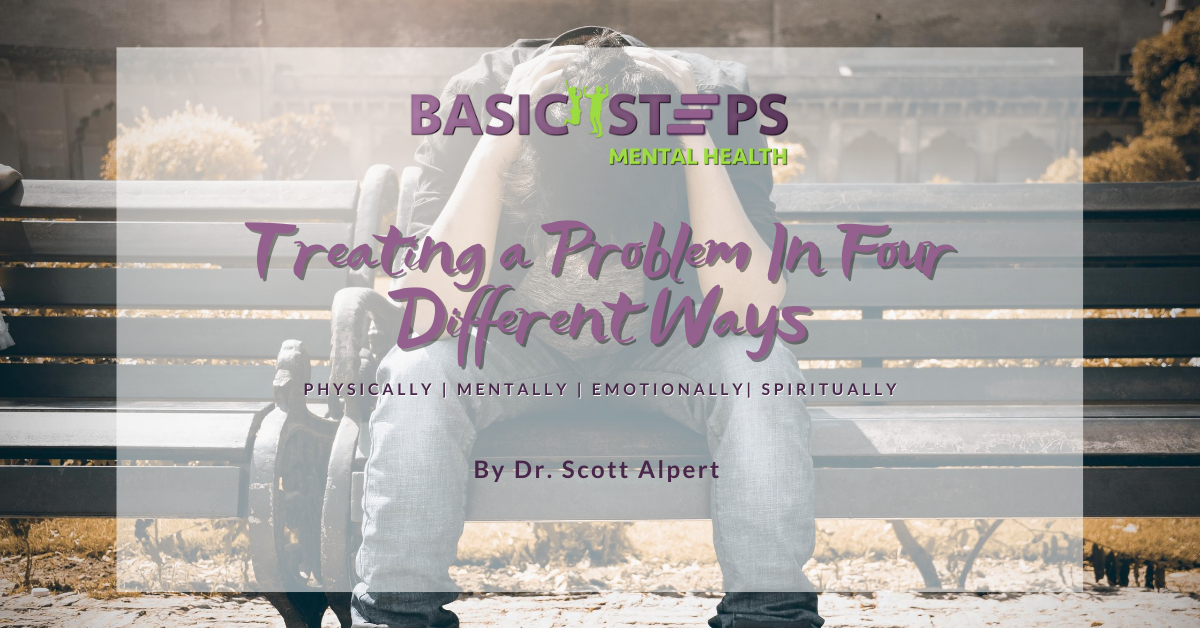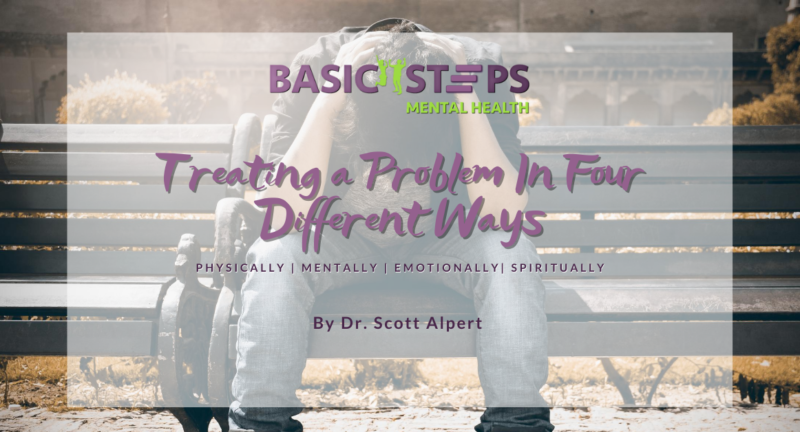
Treating a Problem In Four Different Ways
Spiritual Psychology has its roots from the early 1900s when Roberto Assagioli departed from Sigmund Freud who believed that man was motivated by sexual needs. Assagioli believed that people were motivated by the need to be whole – basically enlightened. This model forms the basis of the Spiritual Psychology movement of today.
It is understandable that people do not want to suffer, but how to treat it has differed greatly from the beginnings of Psychology. To the Behaviorists like Dr. Phil and Tony Robbins, it means doing the proper behaviors over and over again until they become the new normal. The 12 Steps of AA is based on this model.
To the Cognitive Psychologists, they believed that an error in judgment is at the root of difficulties and efforts were made to replacing negative, self-defeating thoughts with more functional, positive ones. Here is where Albert Ellis with Rational Emotive Therapy leads the way. SMART Recovery is based on this model.
With emotions, there is a language all its own and Psycho Drama is an excellent method to address the parts inside of our subconscious mind that are wounded and stuck. If you think that talking to an empty chair is crazy making, think again, it is one of the most beneficial tools to working out problems that you may have with anger, anxiety, and hurt. It is important to understand that we cannot think our way out of an emotional wound. We have to process through it.
Spiritually, there are psychological approaches as well. Visualization, prayer, and meditation top the list and can be found in Psychosynthesis, and currently Spiritual Psychology. Forgiveness of self, done properly, can ultimately lead a problem to rest, once and for all.
If we were to only focus on only one of these levels, it would put us out of balance. If we were to lose 20 pounds and improve physically, the underlying mental and emotional levels would wreak havoc. That is because those levels would be operating at a lower energetic and want to improve. Working on all the levels at the same time gives us the best odds for overall success!
Conventional Psychology will do an exploration into the subconsciousness. That “Ah-Ha” moment is believed to take place when some realization pops up from out of nowhere and the lightbulb goes on. Well, unfortunately once something comes to the surface and left untreated, it can lead to being retraumatized and can make matters worse. We sure learned this at our crisis center. Therapists were having people recall traumatic events and then leaving them to suffer. Spiritual Psychology then came along and helped people apply love to the part inside of them that went through that experience – giving Psychology a new facelift. Unfortunately, not too many therapists have been trained to do so.
Treating a problem four ways is different. According to how we normally do something, we usually take medication, exercise, eat right but why is the problem still there? Then we take it to the next step, positive thinking, yoga, meditation. And still, the problem exists. I’ve heard other therapists blame the client – “They are not putting in enough effort”. Before blaming the victim, why not look at the approach?
Let’s use anxiety as an example. What if you woke up with an anxiety attack – what would you do?
Here is a four-level approach that we suggest.
1.) Physically:
Relaxation, sleep 6 to 8 hours, hydrate your body, eat healthy food in small amounts, do light exercise, take supplements and your prescribed medication.
To be honest, you probably are well versed in the physical approach because this is what our society has been trained to do.
2.) Mentally:
Replace negative thoughts with positives. How many negative thoughts do you have in your head a day? Know that we have 30,000 to 90,000! Habitual thoughts will automatically make you think negatively. Therefore, creating a positive statement about yourself and repeating it often throughout the day will cut down your self-defeating thoughts. How often do you think about the worst thing that can happen? These “Future Negative Fantasies” have an emotional element, where we believe the negative thing is actually taking place! Why not think about the best thing that can happen? Or, why not remain in the here and now and manage things as they happen?
There are many approaches mentally to consider. Rational Emotive Therapy address the rules in which you live by. These EGO rules make us judge and jury of ourselves and others. Why not change the rules that you bought into?
Mentally there is something called “Projections”. As we point our finger at others, there are three fingers pointing back at us. Since we are mirrors to each other, then who are we really judging? These Projections give you a clue into how you are doing with yourself.
Intention setting is a Spiritual Psychology tool that has you focus on what you want and start making incremental steps towards it. For example, “My intention is to be at ease”.
3.) Emotionally:
Well, fasten your seatbelt on this one. These tools are not logical, so if you find yourself judging this as bad or wrong, know that your EGO is grappling with it.
Let me start off this modality with this, as children up to the age of eight, we were only emotion. Our brain hadn’t fully wired and we had had no ability to process what was happening. To release things, we did so through reenactment play.
To heal emotionally, give a voice to your anxiety and letting it communicate to you. You can really learn a lot about what is happening underneath your surface. Fun stuff, because play is often a major part of emotional healing. Talk with the anxious part inside of you. What is it telling you? What does it want? Then follow through on all requests. This is really at the core of emotional healing. Because you haven’t been listening to yourself, a deeper part of you is using anxiety as a way to get your attention.
Seems bizarre? Oh, I haven’t even begun talking about emotional healing because there are so many techniques. I just personally like the play part because it can be fun. Fun? How can there be fun when addressing some hardcore issues? Because when we open our hearts to our hurt, we heal. Hugging a pillow that can represent the baby you is not logical. It is emotional. Spiritual Psychology can be seen as the psychology of tender loving care towards self.
Can others do this to you? Think about this. Have they? This is your individual journey to the core of you that is wounded and abandoned, not by them, but by you. I tried to warn you about the emotional level being bizarre, but with a little training, you can master this very thing.
4.) Spiritually:
I hesitate to write about this topic because our society seems spiritually dead. With the pandemic and us getting shut indoors, after a while you might actually ponder your life. Why are you here? What is your purpose? Is there a God? What about death? These existential issues need to be addressed for your wellbeing, otherwise, life can be seen as a death sentence. None of us is getting out of this thing alive.
Notice how so many people have rushed to substances to avoid their core feelings. What if life was to end now? Then what? Prayer and meditation begin the journey. That is if you choose to do this journey. If you wake up in the middle of the night fearing death or fearing you are under spiritual attack since everything is going wrong, then all you need to do is bring in the Light. Being positive, happy, and filled with joy will attract the same. This is called the Law of Attraction. When down people kick us when up, people are up with us. Spiritual Psychology has many tools to attract to you what you would like since the majority of us attract what they don’t like it is refreshing to know there is a different way.
Come in and learn these tools once and for all. How long do you want to continue to suffer on all of the levels? Yes, you may even find yourself talking to an empty chair or drawing something with your opposite hand.
Compassionate Care is Always Available
There are many more tools and strategies you can use in your pursuit of happiness. Here is where we come in. Contact us at Basic Steps Mental Health and let us support and educate you on this journey back to your loving heart center. Imagine living a heart-centered life, regardless of what is happening externally. We’d love to be of help.
For 25 years, Dr. Scott Alpert, the clinical director of Basic Steps Mental Health, has treated over 7,000 people with mental health and addiction problems, using a Psychological approach that mixes and matches ten of the top approaches used in the industry. We are here virtually and in-person to help you get through this COVID-19 pandemic and many other difficulties you may be experiencing.
May you have good mental health.
Related Posts
Treating a Problem In Four Different Ways
Spiritual Psychology has its roots from the early 1900s when Roberto Assagioli...
The Time For a Better You Is Now
How long do you want to tolerate your problems? How long do you...




